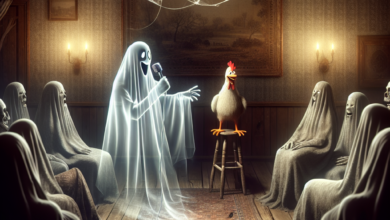Bites and Giggles: A Vampire’s Culinary Adventure
Chapter 1: A Revolutionary Recipe
In the quaint town of Raventhorn, where the mist curled lazily through ancient trees and the moon cast a silver glow upon cobblestone streets, there dwelled a rather peculiar resident. Known to the townsfolk as Count Victor von Bluth, he was a vampire of great renown — not just for his sharp fangs and nocturnal habits, but for his unparalleled passion for cuisine.
Count Victor lived in a castle that stood proudly at the edge of town, its turrets piercing the night sky like spears of obsidian. However, rather than reveling in terror, Victor had taken it upon himself to redefine the age-old stereotypes of his kind. He traded blood for broth and fangs for forks, becoming something of a culinary connoisseur.
On this particularly misty night, Count Victor stood in his enormous kitchen, a space adorned with pots, pans, and an assortment of herbs hanging from the ceiling. He had recently become infatuated with the idea of constructing the perfect lasagna — an ambition that, he believed, would win over the gluttonous villagers once and for all. After all, what could be more enchanting than a plate of gooey, cheesy layers crafted by a vampire chef?
“Tonight, I shall create a lasagna so exquisite that it will elicit giggles from the most stoic of villagers,” Victor mused aloud, addressing his only companion: a fat and oddly cheerful bat named Figaro. Astonishingly, Figaro had developed quite the taste for culinary adventures himself, flitting about the kitchen in excitement.
With a flourish, Victor gathered his ingredients: fresh pasta sheets, tantalizing cheeses, fragrant basil, and a secret weapon — a jar of homemade tomato sauce simmered for hours with spices that made it sing. Each ingredient felt like a crucial player in his culinary symphony.
Chapter 2: An Unlikely Apprentice
As Victor prepared his mise en place, shadows danced across the walls, eliciting a chuckle from him. The secrets of the night were his to command, as were the flavors of the kitchen. However, he sensed that this wisp of a magic moment was about to be thwarted by the very thing that made him most hesitant: the arrival of a pesky yet curious human.
Suddenly, a knock echoed through the high ceilings of the castle. Victor’s ears perked up, and Figaro froze mid-flap, his tiny heart racing. The clock struck nine, a time when the townsfolk rarely dared to approach his abode.
“Who dares traverse my threshold at such an hour?” Victor inquired, his robes swirling around him like dark smoke.
When the door creaked open, and the light from the hallway spilled into his castle, Victor was met with an unexpected sight. A girl, no older than twelve, stood before him, her wide eyes filled with curiosity and resolve.
“Good evening, Count Victor!” she squeaked, her auburn curls bouncing slightly as she spoke. “I’m Lila, and I want to learn how to cook! My grandma told me that you are the best chef around, even if you are… a vampire.”
“That is indeed true, young Lila, but why would a living girl wish to enter a vampire’s lair?” Victor questioned, his curiosity piqued.
“I’ve heard tales of your cooking that could wake the dead — or maybe turn a vampire vegan! I want to enter the Raventhorn Cooking Competition, and I need help.” Lila’s confidence was infectious, and for a moment, Victor found himself disarmed by her spirit.
Figaro flitted down to inspect the girl and, with no apparent fear of the impending doom, landed on her shoulder. She giggled and scratched the bat’s little head, which amused Victor even further.
“Very well, Lila. I shall mentor you in the art of lasagna-making. But be warned,” he said, lowering his voice dramatically, “the kitchen can be a treacherous place for a novice.”
“Bring it on!” she declared, her arm raised triumphantly as if she were launching an epic battle.
And so began an unlikely apprenticeship.
Chapter 3: Layering Magic
Days blurred into nights as Victor and Lila delved into the intricate world of culinary arts. Underneath Victor’s watchful eye, Lila flourished, absorbing everything from the delicate balance of flavors to the transformative magic of heat.
She learned how to make red sauce sparkle with roasted garlic, how to concoct creamy béchamel, and, with just the right amount of seasoning, even the faintest hint of blood pudding reduced to elegant flavor. Lila also discovered that culinary prowess could rival any sorcery and bring people together.
As they prepared for the competition, Lila grew increasingly ambitious. “Count Victor, what if we brewed a ‘Living Lasagna’?” she suggested one evening, her brow furrowed in concentration. “We could add ingredients that dance in the mouth — like exploding cherry tomatoes or a hint of lavender to surprise the judges!”
Victor’s eyes lit up with excitement. He thought the idea preposterous but brilliant all at once. “Why not?” he replied with a grin. “We shall create a lasagna that not only nourishes but also enchants.”
The next few days were a whirlwind of experimentation. Together, they pressed, stirred, and constructed layers brimming with surprises. They filled it with ricotta swirled like clouds and mushrooms that whispered ancient secrets. Each time the oven door opened, a new world of aromas cascaded into the air, drawing both Victor and Lila closer to their culinary masterpiece.
Chapter 4: The Competition
The day of the Raventhorn Cooking Competition dawned bright and uncharacteristically sunny for an October morning. The townspeople, curious and skeptical of the vampire and his young apprentice, gathered in the town square, buzzing with excitement. Stalls adorned with colorful banners stood alongside tables filled with a kaleidoscope of dishes, from fresh-baked pies to spicy stews.
Victor arrived with Lila, a confident young chef beside his traditional, dark-clad figure. As they set up their station, Lila glanced around at their competitors, who were, for the most part, human. One particular chef, a stern-faced woman named Greta, glared at Victor with palpable disdain.
“Why should we let a vampire poison our competition?” Greta sneered, crossing her arms. “Flavors from the underworld can’t compete with fresh, earthly ingredients.”
Victor’s expression softened, and he chuckled. “Fear not, dear lady! I promise my lasagna has not a hint of darkness—only delightful surprise and flavor.”
With the sound of the starting bell signaling the beginning of the contest, panic surged in Lila’s heart. “Count Victor, what if they don’t like our creation? What if they hate us?” she whispered anxiously.
“Culinary art is a delicate dance, Lila. Cooking is about sharing love through flavors, not merely impressing judges.” He smiled reassuringly, filling her with newfound courage.
Chapter 5: The Unveiling
As the sun dipped beneath the horizon, casting a warm glow upon the competitors, Victor and Lila put the finishing touches on their ‘Living Lasagna.’ Victor, meticulously weaving layers of pasta, sauce, and cheese—a true artist at work—while Lila dashed about with colors, garnishing with herbs and decorative edible flowers.
Finally, it was time to present their creation. The crowd hushed as they unveiled their masterpiece — a dazzling, towering lasagna that glistened in the fading light, with pockets of surprise nestled within like hidden treasures.
“Ladies and gentlemen,” Victor announced, his voice commanding. “Prepare yourselves for a dish that not only fills the belly but ignites joy in the heart.”
As the judges took their first bites, time seemed to freeze. A shared hush enveloped the gathering as surprised expressions blossomed on their faces. Eyes widened, and quickly, smiles followed. Laughter erupted soon after, rolls of delight as the unexpected flavors unfolded tantalizingly on their tongues.
Greta, initially stoic, found herself smiling despite her reservations. “What sorcery is this?” she pondered aloud, glancing at Victor.
“It’s simple,” he grinned, gesturing at Lila beside him. “A sprinkle of curiosity and a dash of laughter can make even the simplest of ingredients extraordinary.”
Chapter 6: Celebration and New Traditions
The competition ended with a joyous uproar, and by the time the judges announced the winners, it was clear that Victor and Lila had captured the hearts and palates of the crowd. Lila beamed with unadulterated glee as the golden trophy gleamed in her hands. Before he knew it, Victor found himself wrapped in jubilant hugs and laughter.
As the festival continued, villagers poured out stories of their own culinary tales, and some even approached Victor with the proposition of holding a cooking class at the castle. “Perhaps we judged you too soon, Count!” one farmer remarked, grinning widely, eager to learn from their newfound chef.
From that day forth, Victor’s castle became a hub of culinary joy. Classes flourished, people gathered to share food, stories, and laughter. Each week, Lila and Victor invented new dishes, and a tradition was born: “Bites and Giggles,” a communal evening filled with food, camaraderie, and the laughter of both humans and mythical creatures.
Victor had found his calling, not just as a chef but as a bridge between two worlds. And as for Lila, the baton of culinary wisdom had been passed onto her. The girl who had dared to enter a vampire’s lair had emerged with not only a trophy but a friendship that would last a lifetime.
Together, they laughed, cooked, and lived, proving that sometimes, the most delightful surprises come from the most unlikely of friendships. And with every layer of pasta they crafted, Victor and Lila transformed fear into flavor, darkness into delight, and isolation into camaraderie.
The castle of Count Victor von Bluth, once shrouded in mystery, had become the heart of Raventhorn, where every Bites and Giggles evening resonated with the magic of friendship and the joy of culinary adventure—filling the air with laughter and the unmistakable scent of blooming possibilities.





